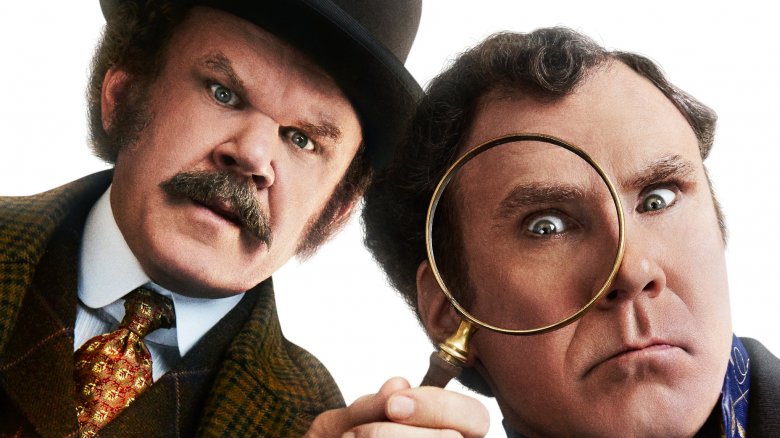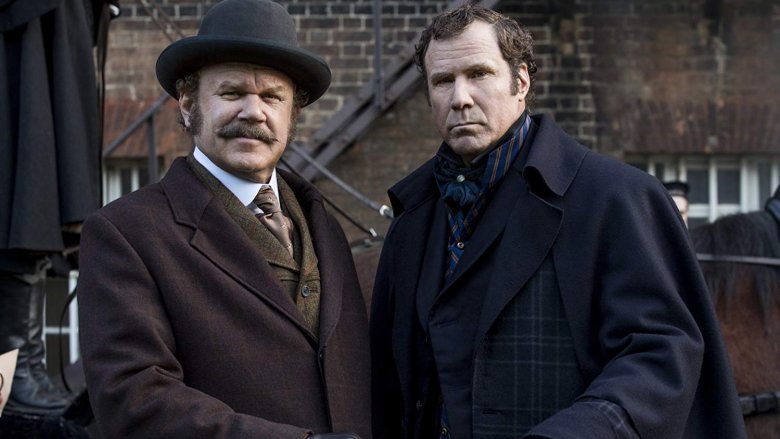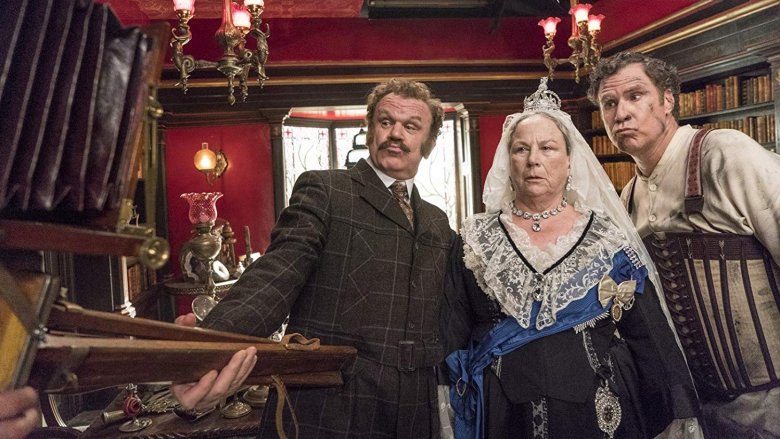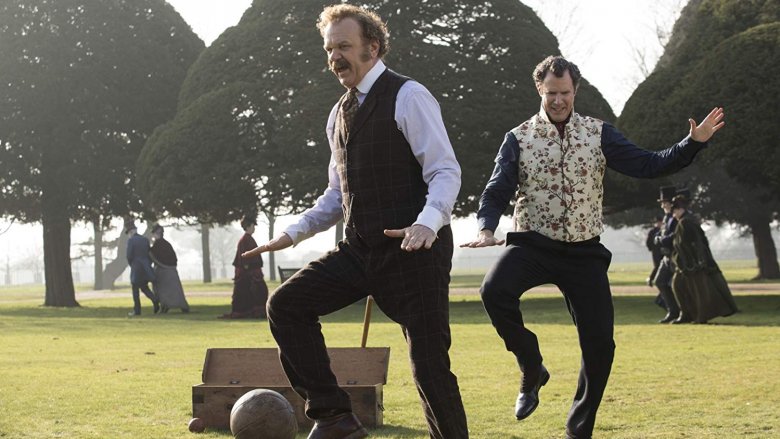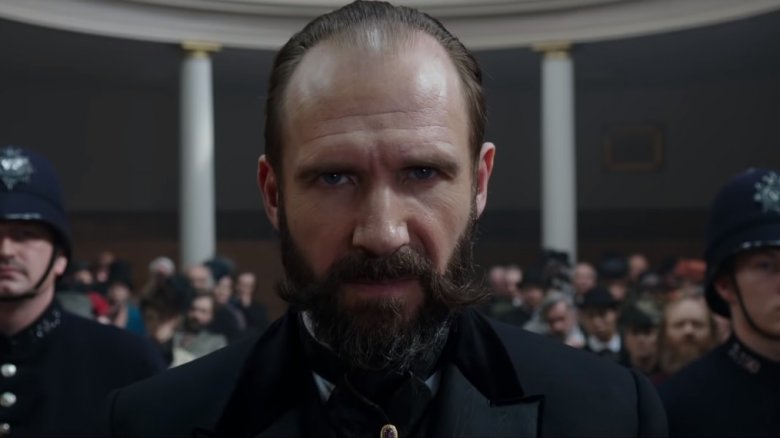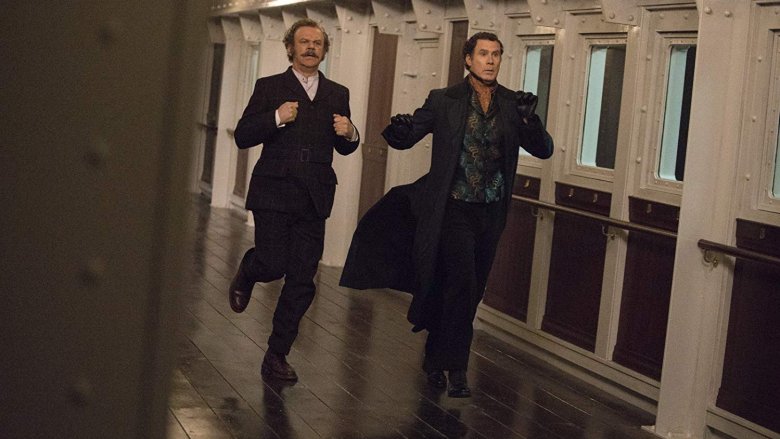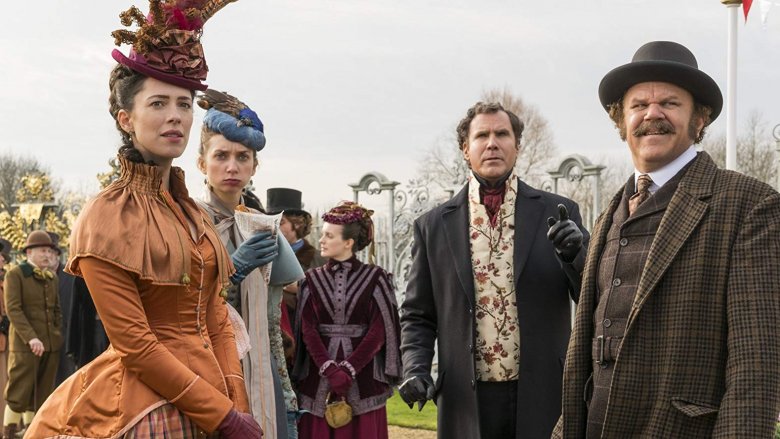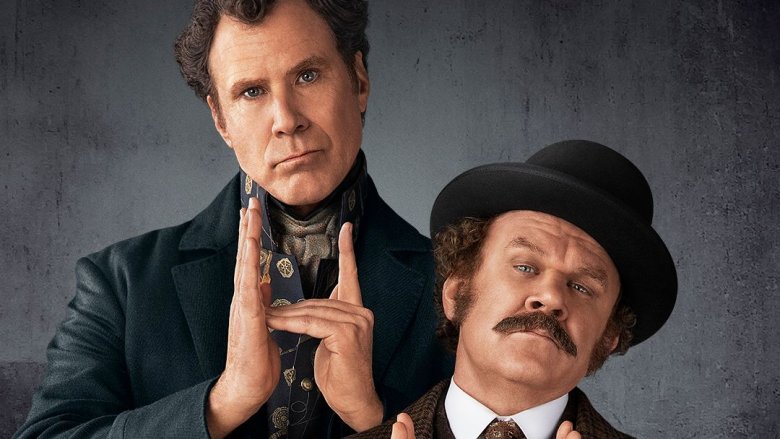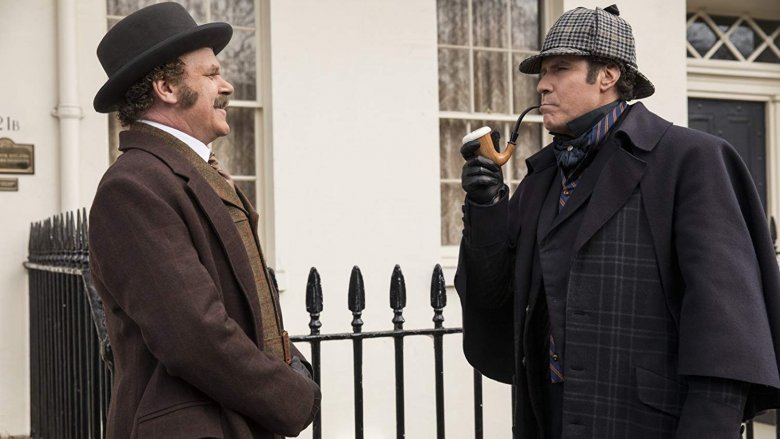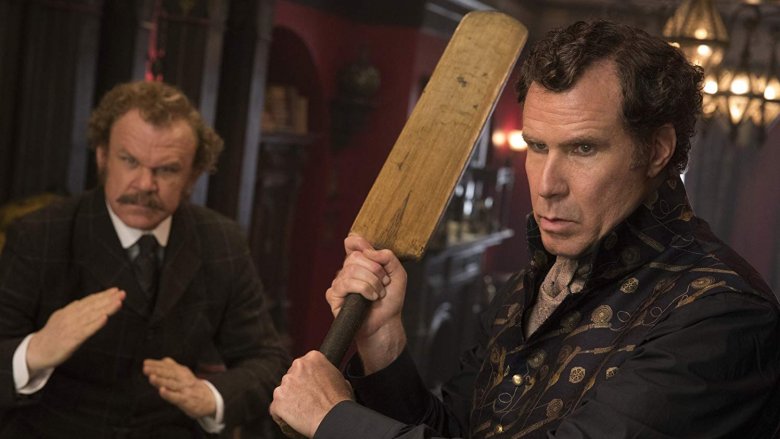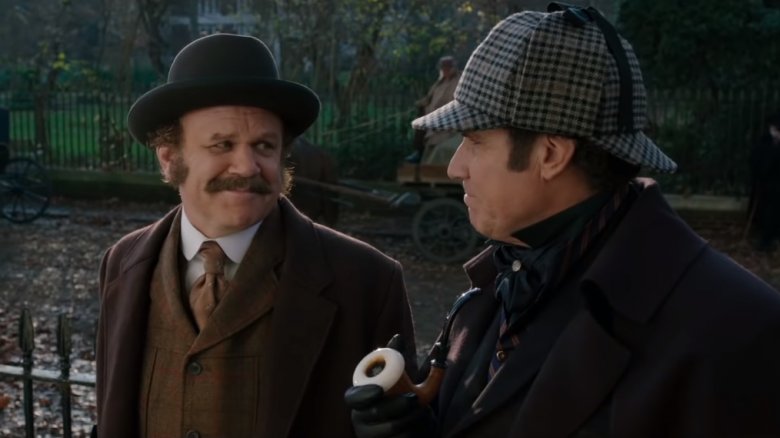Why Holmes And Watson Bombed At The Box Office
Sometimes a movie comes along that's so bad, it's a mystery how it ended up in theaters to begin with. One surprising new entry in that canon is Holmes and Watson, the new comedy from writer-director Etan Cohen, starring the can't-miss comedy duo of Will Ferrell and John C. Reilly. At least, it's an idea that looks good on paper. But in practice, the Sherlock Holmes spoof came out to a cold reception, promptly being received as one of the worst movies of 2018.
What happened to make this movie such a turn-off? Is Holmes and Watson really that bad? Apparently so — since its Christmas Day release, critics and audiences alike have been teaming up to tear apart the project, with even the rare good review still describing considerable portions of the movie as "painful." That's not how comedy is supposed to work. Let's compile the evidence, and crack the case of how and why Holmes and Watson bombed at the box office.
The adventure of diminishing returns
Whatever excitement there was for Holmes and Watson — and anecdotally at least, there didn't seem to be very much — came thanks to the caliber of its two lead actors, John C. Reilly and Will Ferrell. On top of being respected comedic performers in their own rights, the duo had previously worked together to great effect in projects large and small, from weird Tim and Eric-esque shorts on Funny or Die to major studio releases like the oft-lauded Step Brothers.
Reilly and Ferrell first came together in a big way for the 2006, country-fried comedy Talladega Nights: The Ballad of Ricky Bobby, a sendup of NASCAR and southern-style culture that brought in over $162 million at the global box office. That was followed in 2008 by the more enduringly-beloved Step Brothers, which earned over $128 million globally against a relatively small budget. But while Reilly and Ferrell haven't gotten any less funny over the years, their appeal as a comedic duo managed to fail them with Holmes and Watson, which will be lucky to break even at the box office. A week after its release, the movie had earned around $24 million against an estimated budget of at least $42 million — not exactly the sign of a successful reunion.
Deduce this
It doesn't take much research to determine that people are sleeping on Holmes and Watson for a very good reason — this movie is bad. It's wretched, it's turgid, it's offensively rotten. According to the critical consensus, it is a cringeworthy experience in attempted comedy that will leave your skin crawling. Reviews describe the movie in insulted tones, threading in reactions of disappointment and raw anger, with the movie's few good reviews only really making the argument that it's not the worst thing in the world.
One devastating half-star review, coming from David Fear writing for Rolling Stone, describes the movie as being alternately "agonizing," "painfully unfunny," and ultimately depressing, which all seem like extreme reactions for what clearly intended to be a lightweight historical farce. Joshua Rothkopf with Time Out described it as "a completely charmless, laugh-free experience." Even among the more forgiving reviews, there is not a single write-up of this movie out that makes it sound like something worth the trouble of schlepping out to the cinema. Trips to the post office get better reviews.
Sign of the goose egg
One of the first signs that the wheels were going to fall off of Holmes and Watson's release was the suspicious lack of screenings for critics, meaning that professional reviewers had to wait until the movie was out in the wild before rendering their judgments on its quality. It didn't take long to see why the studio (The Sony-owned Columbia Pictures, in this instance) held back. When the first reviews were tallied, Holmes and Watson ruined Christmas with a monocle-popping zero percent score on Rotten Tomatoes, with 12 reviews being tallied toward that perfectly imperfect score.
This is the kind of stuff that schadenfreude is made of. Word spread quickly of Holmes and Watson's misfortune, with headline after headline being written to capitalize on the movie's great shame. There's a visceral pleasure in seeing such an expensive endeavor crash and burn so publicly, and even though the movie's aggregate score ticked up to 8% favorable by the time 51 reviews were counted, the movie's fate had already been sealed. A movie so poorly reviewed may be a morbid curiosity for future streamers and home viewers, but this isn't the kind of reaction that makes you want to see it in a theater. Better to watch this fiery train wreck smolder from a distance.
Hounding Netflix
The notoriously low review scores weren't the only bad press Holmes and Watson received during its rollout. The day after it was released to 2776 theaters, Deadline twisted the knife on its misfortunes with a humiliating (and quite telling) story. According to the outlet, the people responsible for Holmes and Watson had previously tried to prevent the movie from having a theatrical release at all, instead attempting to foist it off on Netflix in an effort to contain the damage. Netflix, of course, looked this dead horse in the eye and said "No."
When it comes to what happened behind the scenes, it's worth directly quoting reporter Anthony D'Allessandro, who wrote that "test scores for Holmes & Watson were so bad that Sony tried unloading the movie to Netflix, but the streamer wouldn't buy it." The story, which was corroborated by The Wrap reporter Alonso Duralde, helped further sink the movie's fortunes at the box office. Why would anyone want to watch a movie that was so bad that Netflix didn't want it? Sure, there may be some hidden gems in that service's library, but it's also the late-career home of Adam Sandler — a man responsible for a movie that actually kept its zero percent score on Rotten Tomatoes.
A study in walkouts
A movie doesn't have to be a hit with critics to be a smashing success. In 2018, the big story on that subject was Sony's own Venom, which critics all-but-hated and general audiences adored. There has been no such disagreement on the subject of Holmes and Watson, the audience score for which Rotten Tomatoes tallies at the time of this writing as a mere 29%.
Theatergoers seemed to prove just as angry with Holmes and Watson as critics were, but instead of penning lacerating write-ups of the movie's failings, they simply left the theater. For a diverse array of reasons, every movie has its share of walkouts — the 2018 Suspiria comes to mind — but in the case of Holmes and Watson, the idea of audience walkouts mutated from isolated instances into the sign of a developing trend. They say all press is good press, but stories about the movie being literally unendurable put a real test to that notion.
A poisonous pitch
It has been noted that the marketing campaign for Holmes and Watson was curiously (and in retrospect, suspiciously) muted. If not for the wickedly poor reception the movie received, it's possible you wouldn't have even heard of it. The stealthy approach to the movie's marketing came off as perhaps a telltale sign to savvy moviegoers. When you have a hit on your hands that you're confident in, you get the word out early, and do things like announce sequels to the movie before it's even proven itself in theaters. When you have Holmes and Watson, you just throw it into the crowded holiday mix, cross your fingers, and hope no one gets too mad at you.
When a movie's bad enough, this tactic of sneaking a movie into theaters can be a downright insulting approach. Combined with the story of the attempted sale to Netflix, all signs point to the people in charge of this production knowing full well they had a terrible dud on their hands — but that didn't stop them from trying to make what money they could with it, off your backs. It's for that reason, if for nothing else, that those responsible for this disaster should be ashamed.
Word of mouth
Over the course of its opening weekend, Holmes and Watson managed to rake in enough money to earn a number seven spot at the domestic box office. It was a performance that had it coming in behind the second weekend performances of Aquaman, Mary Poppins Returns, and Bumblebee, as well as the third weekend runs of Spider-Verse and The Mule. (It was just barely edged out for sixth place by Dick Cheney biopic Vice, the other big new movie of the weekend.)
It almost goes without saying that seventh place is a pretty bad place for a movie to start — even one with a relatively modest budget like Holmes and Watson. At this point, the movie's only saving grace would theoretically be positive word-of-mouth, but there doesn't seem to be much of that going around. Instead, it seems like the buzz is going overwhelmingly in the opposite direction, leaving nowhere for Holmes and Watson to go but down. Fortunes have turned around before for movies that had inauspicious debuts, such as the remarkable run of 2017's The Greatest Showman, but that movie benefited from crowd-pleasing qualities that Holmes and Watson seems to sorely lack.
More compelling cases
Even if Holmes and Watson had been significantly better in quality, with a compelling sense of charm and jokes that didn't wither your mortal soul away, it still would have had a tough time competing during the crowded holiday window in 2018. Superheroes and action tentpoles continued to rule the day on Christmas, with movies like Spider-Verse and Bumblebee being much more attractive draws for family crowds than potentially divisive gross-out comedy.
It's also been noted in a December 2018 article in The Verge, written partially in response to Holmes and Watson's DOA theatrical rollout, that audiences are increasingly turning away from broad studio comedies, at least when it comes to buying tickets for their debuts. Increasingly, comic book movies are subsuming the comedy genre, threading in crowd-pleasing quips and blurring genre lines with movies like Deadpool 2. (Even Avengers: Infinity War had some funny moments of levity that could make viewers of all ages smile, and that movie killed Spider-Man.)
Well run dry
Hollywood loves intellectual property. It's accepted wisdom in the entertainment industry at this point that basing a project off of some pre-existing media property will lead to better returns than releasing a movie with an original story. By that logic, name recognition equals positive viewer response to the same extent that a shiny object attracts an otherwise disinterested cat. But in the case of Holmes and Watson, that aspect seems not to have meant all that much.
One version or another of the Holmes and Watson project has been in development since 2008. As a result, the movie inescapably has a whiff of staleness about it, as the Sherlock Holmes property has arguably been run into the ground in the decade since work on this movie got started. Even by 2014, the entertainment market was absolutely saturated with Holmes content, with at least five TV shows, two big-budget Guy Ritchie film adaptations starring Robert Downey Jr. and Jude Law, and then a smaller 2015 film starring Ian McKellen to top things off. We've got as many variations of the Sherlock Holmes story as we do versions of Robin Hood — and 2018 wasn't that receptive to a new Robin Hood movie either.
Why ruin Christmas?
In short, Holmes and Watson bombed at the box office because it is a failure. It failed as a comedy, and it failed as a movie. It failed to ignite the same passionate response as previous collaborations between its capable leads, and it failed to attract audiences in the middle of a crowded holiday season.
The broad critical consensus is that Holmes and Watson is just not worth seeing, even for curiosity's sake. It is tainted by a cloud of embarrassment and flop sweat that lingers over the whole production. It will not last long in theaters, nor is it likely to find a second life on home video, rediscovered later as some under-appreciated cult classic. It is, at best, on the same level of quality as a middling, mid-show Saturday Night Live sketch — the kind that you can completely forget about over the course of a commercial break. The detective work here is pretty simple — it bombed because it deserved to.
